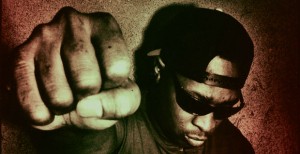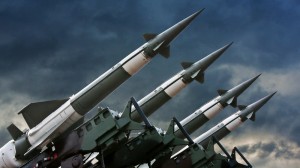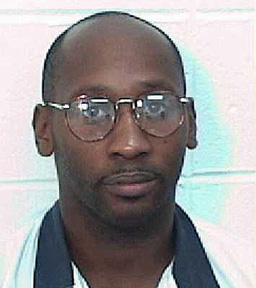Via The Progressive. Chuck explores some very interesting ideas in this interview, particularly around corporate and state influence within hip-hop.

Chuck D
Q:You have been an outspoken opponent of the Bush Administration and the war in Iraq.
Chuck D: Where do we start with these guys? The first thing I would like to say is that to be truly American and represent American ideals you need to consider yourself a citizen of the world. American policy has gone contrary to that ideal. The Bush Administration is bent on making the world submit to “Americanism” instead of becoming a member of the world community. This orchestration comes from the very top of the Administration and has pushed America into a corner.
So, rather than trying to humbly mix with the rest of the world, we are forcing ourselves upon it. We seem to create conflicts with everyone.
Q: How is the Bush Administration trying to coopt hip-hop for war?
Chuck D: The powers that be are trying to meld, shape, and corral the culture of hip-hop into another speaking voice for the government.
They have exploited hip-hop and some of the culture around it—magazines, videos, etc.—to recruit people into the military. The Army says it will give out Hummers, platinum teeth, or whatever to those that actually join. Early on in the recent war, Vibe magazine was working with the Army to recruit black youth. They are willing to do this because they will take money from the highest bidder. It’s one corporation dealing with another corporation.
Q: How are corporations commodifying hip-hop?
Chuck D: If you checked out the news lately, McDonald’s offers a king’s ransom to any hip-hop artist who is able to put Big Mac into a song. MTV—and more to the point, Viacom—is succeeding in extending a teenage life to twenty-nine or even thirty-one years old. It is about extending this market and removing any intelligent substance in the music. Why would twenty-six-year-old “teenagers” care about political ramifications if their backs are not up against the wall? But if their backs are against the wall they may be plucked to fight in Iraq, and all of sudden they become politicized real quick.
Q: Do you think that hip-hop can escape the corporate grip?
Chuck D: I always remain optimistic. There are three levels of music production: the majors, indies, and what I call “inties,” music distributed via the Internet. The Internet is one area that I have used pretty effectively to break free of corporate control.
Alternative spaces, independent media, satellite, these all provide some tools by which we can work more independently and deal more directly with communities we hope to reach. Distribution is key, and finding alternative ways to do that with new media is critical.
Q: Why did you get involved with the Internet?
Chuck D: I became tired of submitting my art to a panel of corporate strategists who decide if it meets their standard of what gets into stores or not. It was quite simple for me: they act like judge and jury of my art, and that is unacceptable. I wanted to give it right to the public.
Q: How would you describe Public Enemy?
Chuck D: Public Enemy started out as a benchmark in rap music in the mid-1980s. We felt there was a need to actually progress the music and say something because we were slightly older than the demographic of rap artists at the time. It was a time of heightened rightwing politics, so the climate dictated the direction of the group. The Berlin Wall was up. Nelson Mandela was in prison. Margaret Thatcher was running the U.K. Reagan was out of control in the White House. And Bush Senior was Vice President soon to be President. You can say we were up against it.
Q: What were some of the influences on Public Enemy?
Chuck D: The Last Poets, Gil Scott-Heron, and also eight years of rappers that came before us. I grew up with Motown, Stax Records, and Atlantic. The Philadelphia International sound like the O’Jays had a profound influence on me. As a late teenager, the punk movement pushed me further. In particular, the Clash, which happened to leak through the time of disco, showed me that there was this cross-cultural sound that could cut across genres and audiences. Like punk was to disco, rap music was a rebellion against R&B, which had adopted disco and made it worse.
Q: What kind of political and cultural resistance did Public Enemy encounter?
Chuck D: We were coming out of the black community with this thing called rap music, which was basically black men yelling at the top of their lungs about what we liked and what we didn’t like. It was disturbing to the status quo. It really shook things up. And those in power didn’t know what to make of us, but they knew that we had to be silenced, stopped in any way from expressing our outrage.
Q: The media was quick to characterize Public Enemy as militant black nationalists.
Chuck D: That comes directly from how and when we grew up. We came up in the 1960s. Political and cultural groups like the Black Panthers, and the Nation of Islam were reference points. Our parents brought the work of these groups to our attention, and it was educational and inspiring. My parents were radicals politically, but more than anything they were young parents who actually understood that there was a need and a time for change. They had a respect for the civil rights movement but also understood the need to further it. As black people we were out to further our equality. I don’t pay attention to the controversial connotations put on by media and the undermining labels they place on us. We pay attention to what our community situation is and what we need.
Q:Talk about It Takes a Nation of Millions to Hold Us Back.
Chuck D: It Takes a Nation was an album that happened to cross the roads at the right place at the right time. Rap music, as recorded work, was just eight years in. The music was ready to break nationally in album form as opposed to what it had been, which was a singles medium. The album was released by a small radical label called Def Jam. Def Jam was distributed by staunch old school institutions such as CBS and Columbia. We happened to find that loophole and use their distribution system to be able to get to the people in a brand new state of mind. We wanted to be a social critic, a community voice. We wanted everyone to know, truly understand, that our music was from the people, not above the people.
Q: What are some of the songs that remain vital from It Takes a Nation?
Chuck D: “Don’t Believe the Hype,” without question, still speaks volumes. To me it is Noam Chomsky-like in its theme and content. Like Chomsky does with his work, “Don’t Believe the Hype” addresses media disinformation and picks it apart.
Q:The album in many ways was Public Enemy’s Manufacturing Consent.
Chuck D: Definitely.
Q: Who are some current rappers that you like?
Chuck D:: Nas, Mos Def, and Talib Kweli for sure. Wu-Tang Clan delivered the goods musically and to a certain degree politically, in particular GZA/Genius. But I must point out that if you had to look in a book for the definition of a rapper you would probably see a picture of Jay-Z. He is the chosen one right now.
Q: Do you think current hip-hop artists like Jay-Z possess the same kind of timeless quality that Public Enemy has?
Chuck D: Someone like Jay-Z does have a timeless quality, but it’s much different than ours. You can look back at something like “At the Hop” by Danny and the Juniors or the music that was on American Bandstand in the 1950s-’60s. It was the emergence of rock in the suburbs—without its teeth, let’s say. You will get the same thing out of Jay-Z with the street hustler mentality of the late 1990s. It won’t be able to resonate far beyond that, but it’s something that will go on with just a different person telling it. When it comes down to Public Enemy and the Clash or Bob Marley, who is a great example, you can play the music now and it’s like, “Damn, what the music is saying is just as important today as it was when they recorded it.” It also becomes a powerful historical document of a particular time of struggle and resistance. But this is maybe the purpose of artists like Public Enemy—speaking truth to power—while artists like Jay-Z represent the escapism of that time.
Q:What are your thoughts on Eminem’s foray into politics with the anti-Bush song “Mosh”?
Chuck D: These are inevitable destinations for artists like Eminem.
Where else can you go with respect to the work, lyrics, and message of the music? If you are past high school age, you can get by with saying very little the first or second time around. However, after a while you know you are going to have to say something beyond high school stuff. Eminem has talent, and his talent is the thing that influences many young people who would have never gone anywhere near rap. White kids in different parts of the world use him as a barometer and the standard to live up to. In some ways, Eminem is an artist who has ushered in a new movement.
Q: So, do you see someone like Eminem leading to more diversity in hip-hop—not just white rappers but across the ethnic and cultural spectrum?
Chuck D: If you want to speak about different ethnicities and diversity, rap and hip-hop are all over the planet. Every country, from Turkey to Australia, now has tons of hip-hop artists. The music and artistry have moved way faster than the corporatization of the music. You do need organization and opportunity for these artists to express themselves, and I don’t think it has to come from a corporate co-signing.
Q: And what about the current wave of bad press for rappers like 50 Cent?
Chuck D: A lot of artists have been persuaded into doing whatever they can do to gain attention. The media, of course, will position and promote the worst of them to the front page. The sidewalk to crime becomes the marketing campaign. These artists have seen it work and sell millions and millions of records for other artists.
Rap comes from the humble beginnings of rebelling against the status quo. Now, rappers have become the status quo themselves. You can’t rebel against the Queen and then become the Queen yourself. I attribute much of the blame to testosterone—male dominance and patriarchy.
Q: Hip-hop is thirty years old and now a dominant global musical force. What has been the biggest change in hip-hop over this period?
Chuck D: The biggest thing that has happened to hip-hop in the last ten to twelve years is the clinging on to the corporation as the all-mighty hub of the music. When culture is created in boardrooms with a panel of six or seven strategists for the masses to follow, to me that is no different than an aristocracy. It’s not created from the people in the middle of the streets, so to speak. It is created from a petri dish for the sake of making money, and it is undermining the longevity of the culture.
Q:Then music for you is about building a community.
Chuck D: I don’t think that the music should be above the people.
Class doesn’t cost a dime, and you spread it around. Knowledge, wisdom, and understanding don’t come out of the microwave. You got to keep moving forward because the evil doesn’t sleep.
Q: Why do you consider yourself a citizen of the world?
Chuck D: I first consider myself a man and then a grown adult at that. Next, I know I am judged unfairly by my physical characteristics and ostracized because of that so I say, “Yes, I’m a black man.” Then it goes to things I do—songwriter, musician, and activist. I adhere to the philosophy, “I don’t care who writes the laws, let me write the songs.” Our expressions in the arts are something that reflect life and propel us as human beings. Culture is this thing that we can exchange among ourselves as human beings to knock aside our differences and build upon our similarities. Cultural exchange is the ultimate exchange.
Q: You do a radio show on Air America, tons of public speaking and performing. Discuss your most recent activism.
Chuck D: My work throughout my life is always representative of the time we live in. It’s all about keeping it in order and keeping it in gear. I want to always move forward with everything I am doing. So, I do the radio show, speak at universities and other social institutions all around the world, appear on TV, and continue to create music all in the hope to keep the struggle alive. Most other artists are always fighting for their fame. They have that fear, like the saying goes, “out of sight, out of mind.” They need to keep themselves out there. I have never had that fear. If I have any fear, it’s not doing enough to reach people.
 This week we’ve heard that not only have the Olympics disrupted our transport system more than snow blizzards on top of autumn leaves, but that they also meant that our city is to be militarised, quite literally, out of the money this whole country, not just London, pays in tax. The Royal Navy have deployed their largest assault vessel, HMS Ocean, in Greenwich, Marines encircle our coast, in the city centre itself there will be 12,500 “Olympic Police, 13,500 armed services (2,000 of which fully armed), 5,000 specialist police, 1,000 in logistical support, not to mention the 7,500 private security forces roaming the street. A combined force of 23,700 security forces will restrict liberty for the “safety” of us all. Security on such a vast scale will be overseen by that beacon of democracy G4S, the private security company that has recently made inroads into schools, prisons and roads– big societing it up.
This week we’ve heard that not only have the Olympics disrupted our transport system more than snow blizzards on top of autumn leaves, but that they also meant that our city is to be militarised, quite literally, out of the money this whole country, not just London, pays in tax. The Royal Navy have deployed their largest assault vessel, HMS Ocean, in Greenwich, Marines encircle our coast, in the city centre itself there will be 12,500 “Olympic Police, 13,500 armed services (2,000 of which fully armed), 5,000 specialist police, 1,000 in logistical support, not to mention the 7,500 private security forces roaming the street. A combined force of 23,700 security forces will restrict liberty for the “safety” of us all. Security on such a vast scale will be overseen by that beacon of democracy G4S, the private security company that has recently made inroads into schools, prisons and roads– big societing it up.

